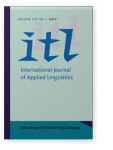Vol. 170:1 (2019) ► pp.111–135
Vol. 170:1 (2019) ► pp.111–135
Explicitness of deductive instruction and L2 development
A study on the Spanish imperfect subjunctive
This study investigated the effects that different types of instruction varying in explicitness had on 88 intermediate-level Spanish learners’ development of the imperfect subjunctive on a reading task. Participants were randomly assigned to one of 3 experimental conditions that differed in their degree of instructional explicitness (+/− deductive). One condition (+Deductive) received a detailed grammar explanation prior to task; a second condition (−Deductive) received a hint about a new target form present in the reading task, and the third condition (Baseline) was not presented with any grammar information or hint. The study consisted of 3 sessions, following a pre/post/delayed computerized test design with 2 weeks between sessions. Results showed that the −Deductive condition performed as well as the +Deductive condition immediately and 2 weeks after treatment for both Interpretation and Controlled production tests.
Article outline
- Introduction
- Background
- Explicitness of deductive instruction and L2 learning
- Method
- Participants
- Target structure
- Materials
- Instructional conditions
- Experimental task
- Learning assessment instruments
- Comprehension test
- Design
- Procedure
- Coding
- Results
- Preliminary analyses
- Controlling for reactivity
- Research Question 1
- Research Question 2
- Discussion
- Research Question 1
- Research Question 2
- Limitations
- Conclusions
- Acknowledgements
- Notes
-
References
